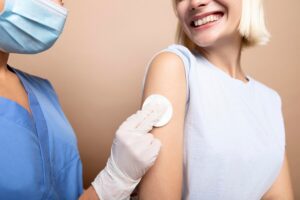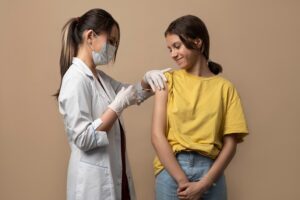Human papillomavirus (HPV) is one of the most prevalent sexually transmitted infections (STIs) globally. Certain types of HPV are linked to cervical cancer, genital warts, and other cancers. Vaccines for HPV have been developed to prevent infections caused by high-risk strains of the virus. This article delves into the importance of HPV vaccination, its benefits, how it works, and frequently asked questions.

What is the HPV Vaccine?
Overview of the HPV Vaccine
The HPV vaccine is designed to protect against specific types of HPV that are most commonly associated with cancer and genital warts. The vaccine stimulates the immune system to produce antibodies that block the virus from infecting cells.
Approved HPV Vaccines
- Gardasil 9: Protects against nine HPV types, including high-risk strains 16 and 18, and low-risk strains that cause genital warts.
- Cervarix: Protects against high-risk HPV types 16 and 18.
How the Vaccine Works
The vaccine uses virus-like particles (VLPs) to mimic the HPV structure, triggering an immune response without causing infection.
Importance of HPV Vaccination
Preventing Cancer
- Cervical Cancer: HPV vaccination prevents infections from high-risk HPV types responsible for most cervical cancer cases.
- Other Cancers: Protects against anal, oropharyngeal, penile, vulvar, and vaginal cancers.
Reducing Genital Warts
The vaccine is effective in preventing genital warts caused by low-risk HPV types.
Herd Immunity
Widespread vaccination reduces the overall prevalence of HPV, protecting those who are unvaccinated or have weaker immune responses.
Who Should Get the HPV Vaccine?
Recommended Age Groups
- Adolescents: The CDC recommends vaccination at ages 11-12 for optimal efficacy, as it works best before exposure to HPV.
- Young Adults: Vaccination is recommended up to age 26 for those who missed earlier doses.
Vaccination for Adults
- The vaccine can be given up to age 45, depending on individual risk factors and consultation with a healthcare provider.
Gender Considerations
- Both males and females benefit from HPV vaccination, as it prevents cancers and genital warts across genders.
Vaccination Schedule and Dosage

Standard Schedule
- Two-Dose Schedule: For individuals aged 9-14, two doses are given six to twelve months apart.
- Three-Dose Schedule: For individuals aged 15 and older or those with weakened immune systems, three doses are administered over six months.
Missed Doses
If a dose is missed, the series can be resumed without restarting, ensuring full protection.
Safety and Side Effects
Safety Profile
The HPV vaccine has undergone extensive testing and is considered safe. It has been used worldwide, significantly reducing HPV infections and related conditions.
Common Side Effects
- Injection Site Reactions: Pain, redness, or swelling.
- Mild Symptoms: Fever, headache, or fatigue.
- Rare Effects: Severe allergic reactions, though extremely uncommon.
Addressing Concerns
Numerous studies confirm the safety of the HPV vaccine, and its benefits far outweigh potential risks.
Benefits of the HPV Vaccine
- Long-Term Protection
The vaccine provides long-lasting immunity against targeted HPV types, reducing cancer risks.
- Cost-Effectiveness
By preventing HPV-related diseases, the vaccine reduces medical costs associated with treatment and management.
- Public Health Impact
Vaccination campaigns have led to significant declines in HPV prevalence, genital warts, and cervical precancers.
FAQs About HPV Vaccines
1. Is the HPV vaccine safe?
Yes, the HPV vaccine is safe and has been extensively studied. Side effects are generally mild and temporary.
2. How long does the HPV vaccine last?
Studies indicate long-lasting protection, with immunity persisting for over a decade and no need for boosters currently identified.
3. Can the vaccine treat existing HPV infections?
No, the HPV vaccine cannot treat existing infections but prevents new infections from targeted strains.
4. Are there alternatives to the HPV vaccine?
While there is no alternative for preventing HPV, regular screening and safe practices help manage risks.
5. What if I miss a dose of the HPV vaccine?
You can resume the series without restarting. Consult your healthcare provider for scheduling.
Conclusion
The HPV vaccine is a critical tool in the fight against HPV-related cancers and diseases. Its proven safety, efficacy, and long-term benefits make it an essential part of preventive healthcare. By getting vaccinated, individuals protect themselves and contribute to reducing the spread of HPV. Early vaccination, combined with routine screenings and safe practices, ensures a healthier future for everyone. Take the step toward protection and encourage others to do the same—the impact of HPV vaccination is transformative for individuals and communities alike.
Consult our Sexual health clinic for HPV vaccines (469) 981-0529 or visit us https://tscmlk.com/
